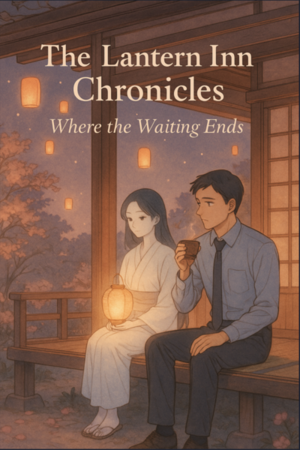Chapter 4:
Fireflies Never Return the Same Way
Lantern Inn Chronicles
They blinked like scattered stars in the garden — not the harsh, anxious neon that bled through Tokyo’s windows, but a quiet, ancestral kind of light. The fireflies danced slow, deliberate patterns in the dusk, as if they remembered a rhythm older than time. The willow beside the inn swayed gently in approval, its long fronds bowing toward the earth like a priest offering silence. In the air, the scent of river moss mingled with the aftertaste of warm rain, soft and familiar — like the pages of an old letter never sent.
Kaito had just finished wiping down the wooden front steps, the old cloth still damp in his hands. The boards were cool beneath his feet, and the lantern by the gate had not yet lit. His breath fogged slightly in the fading light.
Then he heard it: the slow, deliberate sound of wooden wheels against stone.
There was no horse. No driver. Only an old, faded cart emerging from the mist like memory itself — pulled by something unseen, something more suggestion than body. The wheels creaked as if they carried stories heavier than cargo.
And seated in the back was a woman.
She wore layers upon layers of worn silk — the kind that had once been brilliant, now faded into the soft color of mourning sky. Her hair was pure white, coiled low like a sleeping swan at the nape of her neck. Her hands, delicate but unshaking, rested atop one another in her lap with the grace of a priestess long past ceremony.
She did not glance up at the gate. She did not announce her arrival.
She waited — until the sliding door of the inn opened of its own accord.
Then she moved.
Slowly. Without hesitation. With the certainty of someone not visiting for the first time, but returning to a place that had once known her shadow.
When she reached the entrance, she paused only briefly before saying, “Yuri.”
No surname. No backstory.
Her voice was like falling ash — soft, final, and impossible to ignore.
There was no ornament on her — no necklace, no perfume. But her presence was laden with meaning. A simple gold ring, worn to its thinnest edge, sat on her left hand. Around one wrist, three red thread bracelets — faded, frayed, and tied with knots that looked almost like prayers.
“I’ll need Room 7,” she said, almost gently. “The one with the sakura window.”
Kaito hesitated.
There was no sakura tree near Room 7. Not even a stump. Only pine and willow lined the east wing. But something in her voice silenced all questions.
He nodded and led her down the hall.
The girl with the burned hands stood quietly by the shadows, watching. Yuri passed her, then paused and bowed — a slight dip of the head, graceful and deliberate.
“When we break,” she said softly, “it means we were whole once.”
The girl's eyes widened. Her bandaged hands tightened over her sleeves. But she said nothing.
That night, the hearth in the common room lit on its own.
No one had touched it. No match had struck.
Just a soft whoosh, as if the inn had exhaled after holding its breath.
Yuri sat by it, sipping her tea like someone revisiting a taste from long ago. Her movements were deliberate. Not slow from weakness, but reverent — as if each gesture was an offering.
Kaito joined her, still smelling faintly of soap and warm dishwater. He didn’t speak, not at first. She didn’t expect him to.
After several minutes of comfortable silence, she asked, “Do you remember what your last word was?”
The question startled him.
He thought about it. About that dull, fluorescent-lit day that had no warning bells or curtains closing.
“I… I don’t think I said anything,” he said truthfully.
She nodded, as if she had expected that.
“Most don’t,” she murmured. “They just… vanish. Some not even realizing they’re gone.”
She stared into the fire then — not in a daze, but with the focused sadness of someone sifting through ashes for the shape of a face.
“I said his name,” she whispered. “And then I forgot what his smile looked like.”
Later, as Kaito brought her a second cup of tea, she held out her hand — palm up, asking.
He blinked. She was asking for his notebook.
He hesitated. That notebook held every small truth he hadn’t said aloud — every window wiped, every leaf fallen, every ache recorded in neat handwriting like someone trying to organize the mess of being forgotten.
But he gave it to her.
She read silently, flipping through pages with slow reverence. Her finger paused on one line:
“The kettle’s whistle sounds lonelier when no one’s listening.”
Her thumb rested on the edge of the page for a long time — not as if hesitating to turn it, but as if touching something delicate and breakable. Like a wound still warm beneath the bandage. The fire cracked softly in the hearth. Somewhere in the back of the inn, wind stirred the paper screens with the hush of a breath being held.
She didn’t look up right away. Her eyes lingered on that single line:
“The kettle’s whistle sounds lonelier when no one’s listening.”
It wasn’t poetry.
It wasn’t trying to be beautiful.
It was just true.
“You write like someone who waited too long,” she said at last.
Her voice was calm, not accusing, but it moved like a needle through fabric — stitching something closed, or maybe opening it.
Kaito looked down, his hands tightening around his teacup. The porcelain was warm, but his fingers felt cold.
He said nothing.
“Did someone not come?” she asked softly.
The firelight flickered across her face, and for a moment, she looked impossibly old — not in years, but in time carried. The kind of age that grief gives. Her voice held no judgment. It might’ve been mistaken for pity, but it wasn’t that.
It was recognition.
“Or,” she said after a pause, her eyes finally meeting his, “did you not ask them to?”
The words struck like a bell in a temple — soft in sound, but long in echo.
Kaito’s throat tightened. That question curled somewhere inside him, coiling beneath his ribs, where guilt likes to live. He had spent so long keeping silence like a kind of discipline — a shield. But what if it had been a wall? What if the waiting had never been mutual, but one-sided — a quiet game of punishment disguised as patience?
He didn’t reply. He didn’t need to.
Yuri didn’t push. She simply closed the notebook gently, smoothing the cover as if laying something to rest.
They sat like that for a long time, side by side, surrounded by the hush that lives between people who know how to suffer without spectacle.
The next morning, something had changed.
The willow tree outside the east wing — the one that had stood bare and green since Kaito’s arrival — shimmered with a new color.
Pale pink.
Its branches, once thin and silver-green, now wore blossoms — not heavy or showy, but soft and tremulous, like breath returned to form. Petals hung like whispered thoughts, as if they’d bloomed overnight from something deeper than roots.
There had been no sakura tree near Room 7. And yet here it was.
In full bloom.
Kaito stood before it, stunned.
“The inn bends,” Yuri said later that morning over breakfast, “toward what the heart needs.”
She didn’t say it with mystery or magic. Just fact — like how the moon rises or how rain falls.
That day, she told stories.
But not the kind found in books, or retold by fireside boast.
No, she told the quiet ones. The kinds that never make it past kitchen tables. The ones that feel ordinary to everyone except the person who lived them.
Of a husband who whistled off-key while sweeping the porch — every single morning, without fail.
Of a son who left his jacket on every chair in the house, as if he never fully arrived or ever fully left.
Of a scarf — a pale green scarf — that had once been dropped during a winter walk. It had lain there on the path for days, gathering frost. No one had picked it up.
“No one ever knows what becomes important,” she said. “Until it’s already gone.”
The girl with the burned hands sat nearby, still as stone, her eyes lowered beneath the curtain of her hair. She didn’t move. But she listened. Every word stitched something invisible into the air.
Yuri turned to her once — not fully, just enough for her voice to carry directly.
“You can’t carry someone forever,” she said gently. “But you can walk beside their memory.”
And it was then — just barely — that the girl’s hands unclenched.
Later, at sunset, Kaito walked Yuri through the garden path.
The fireflies had begun to stir again, blinking softly like distant windows lighting up across a sleeping town.
Yuri moved slowly, as if listening to the ground. She touched the bark of trees, the curve of stones, the edge of the koi pond. Once, she leaned down and whispered something to the wind.
“I once had a daughter,” she said, not as a confession, but as an offering.
“She left before I could say sorry.”
Kaito didn’t ask what for.
It didn’t matter. Regret wears the same face no matter its origin.
“I thought I’d find her here,” she added, brushing her fingers along the petals of the impossible sakura. “But this place doesn’t work like that.”
“Then why come?” he asked, his voice quieter than usual.
She smiled.
A small, tired, knowing smile.
“Because someone needs to listen to the apology. Even if it isn’t her.”
That night, beneath the wavering light of lanterns and the drifting glow of fireflies, Kaito felt something stir in his chest — not pain, not peace, but recognition.
The inn wasn’t just a sanctuary for the dead.
It was a place for the unfinished.
For echoes that still needed to reach someone.
A place where words long buried might still find breath.
And that night, alone in his room, Kaito finally dared to open the drawer he’d never touched.
Inside: a faded photograph, a phone he hadn’t charged in years, and a dried pressed flower tucked between receipts.
He remembered her.
His sister.
Ten years younger, always louder, always warmer. He saw her again, standing in that hospital hallway, fire in her voice and tears in her eyes.
“You’re always like this, Kaito! You’re not even sad!”
And he had said nothing.
He had watched her leave.
Watched her stop calling.
Let the silence turn to sediment.
Now, with the notebook open in his lap, he wrote with hands that trembled:
“I should’ve said: I missed you already.”
The next morning, Room 7’s door stood slightly ajar.
Inside: no one.
The sheets were folded with care. The teacup untouched, but clean.
A single firefly hovered by the window.
It blinked once — then disappeared into the dawn light, like a sigh let go.
Room 7 was silent again.
But beneath the windowsill, caught in a fine strand of spider silk:
A single sakura petal.
Soft. Weightless.
Proof of something that had once bloomed.




Please sign in to leave a comment.